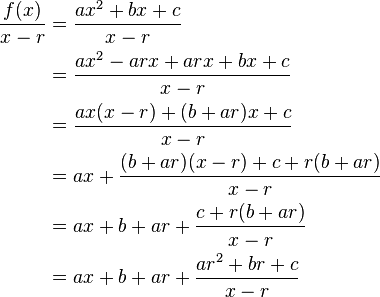Polynomial remainder theorem
In algebra, the polynomial remainder theorem or little Bézout's theorem[1] is an application of Euclidean division of polynomials. It states that the remainder of the division of a polynomial  by a linear polynomial
by a linear polynomial  is equal to
is equal to  In particular,
In particular,  is a divisor of
is a divisor of  if and only if
if and only if  [2]
[2]
Examples
Example 1
Let  . Polynomial division of
. Polynomial division of  by
by  gives the quotient
gives the quotient  and the remainder
and the remainder  . Therefore,
. Therefore,  .
.
Example 2
Show that the polynomial remainder theorem holds for an arbitrary second degree polynomial  by using algebraic manipulation:
by using algebraic manipulation:
Multiplying both sides by (x − r) gives
 .
.
Since  is our remainder, we have indeed shown that
is our remainder, we have indeed shown that  .
.
Proof
The polynomial remainder theorem follows from the definition of Euclidean division, which, given two polynomials f(x) (the dividend) and g(x) (the divisor), asserts the existence and the unicity of a quotient q(x) and a remainder r(x) such that
If we take  as the divisor, either r = 0 or its degree is zero; in both cases, r is a constant that is independent of x; that is
as the divisor, either r = 0 or its degree is zero; in both cases, r is a constant that is independent of x; that is
Setting  in this formula, we obtain:
in this formula, we obtain:
Applications
The polynomial remainder theorem may be used to evaluate  by calculating the remainder,
by calculating the remainder,  . Although polynomial long division is more difficult than evaluating the function itself, synthetic division is computationally easier. Thus, the function may be more "cheaply" evaluated using synthetic division and the polynomial remainder theorem.
. Although polynomial long division is more difficult than evaluating the function itself, synthetic division is computationally easier. Thus, the function may be more "cheaply" evaluated using synthetic division and the polynomial remainder theorem.
The factor theorem is another application of the remainder theorem: if the remainder is zero, then the linear divisor is a factor. Repeated application of the factor theorem may be used to factorize the polynomial.[3]
References
- ↑ Piotr Rudnicki (2004). "Little Bézout Theorem (Factor Theorem)" (PDF). Formalized Mathematics 12 (1): 49–58.
- ↑ Larson, Ron (2014), College Algebra, Cengage Learning
- ↑ Larson, Ron (2011), Precalculus with Limits, Cengage Learning



